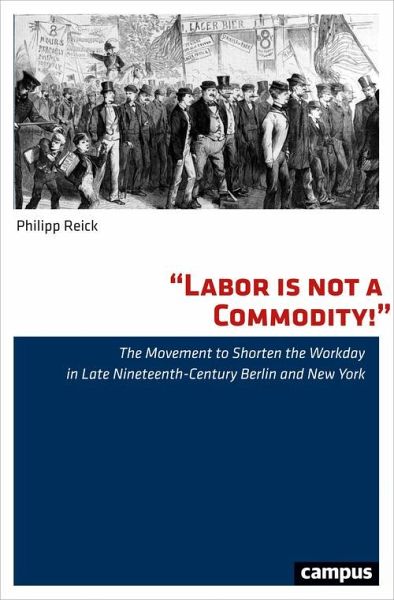
Labor is not a Commodity! (eBook, PDF)
The Movement to Shorten the Workday in Late Nineteenth-Century Berlin and New York
Versandkostenfrei!
Sofort per Download lieferbar
Statt: 46,00 €**
41,99 €
inkl. MwSt. und vom Verlag festgesetzt.
**Preis der gedruckten Ausgabe (Broschiertes Buch)
Alle Infos zum eBook verschenken

PAYBACK Punkte
0 °P sammeln!
Diesseits wie jenseits des Atlantiks interpretierten Arbeiter die ungezügelte Macht des freien Marktes als eine Bedrohung für ihr Verständnis von Autonomie und Teilhabe. Widerstand gegen die "Kommodifizierung der fiktiven Ware Arbeit" war wesentlich im Kampf für politische, soziale und ökonomische Rechte. Am Beispiel der Bewegung zur Verkürzung des Arbeitstags im mittleren 19. Jh. kann Philipp Reick zeigen, dass weder die US-amerikanische Arbeiterbewegung als Abweichung von einer vermeintlichen Norm gelten noch die deutsche Arbeiterbewegung als Verkörperung dieser Norm verstanden werden...
Diesseits wie jenseits des Atlantiks interpretierten Arbeiter die ungezügelte Macht des freien Marktes als eine Bedrohung für ihr Verständnis von Autonomie und Teilhabe. Widerstand gegen die "Kommodifizierung der fiktiven Ware Arbeit" war wesentlich im Kampf für politische, soziale und ökonomische Rechte. Am Beispiel der Bewegung zur Verkürzung des Arbeitstags im mittleren 19. Jh. kann Philipp Reick zeigen, dass weder die US-amerikanische Arbeiterbewegung als Abweichung von einer vermeintlichen Norm gelten noch die deutsche Arbeiterbewegung als Verkörperung dieser Norm verstanden werden kann.
Dieser Download kann aus rechtlichen Gründen nur mit Rechnungsadresse in A, B, BG, CY, CZ, D, DK, EW, E, FIN, F, GR, HR, H, IRL, I, LT, L, LR, M, NL, PL, P, R, S, SLO, SK ausgeliefert werden.













